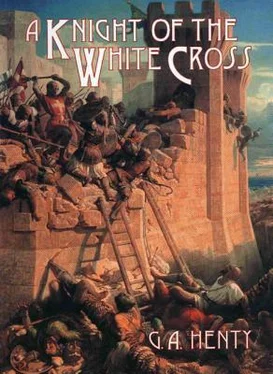"Everything depends upon time. Promises of aid have come in from all quarters, and if Edward delays we shall soon be at the head of an overwhelming force. But Edward, with all his faults and vices, is an able and energetic leader, and must be well aware that if he is to strike successfully he must strike soon. We must hope that he will not be able to do this. He cannot tell whether we intend to march direct to London, or to join Pembroke in Wales, or to march north, and until he divines our purpose, he will hardly dare to move lest we should, by some rapid movement, interpose between himself and London. If he gives us a month, our success is certain. If he can give battle in a fortnight, no one can say how the matter will end."
Edward, indeed, was losing no time. He stayed but a few days in London after his victory at Barnet, and on the 19th of April left for Windsor, ordering all his forces to join him there. The Lancastrians had endeavoured to puzzle him as to their intended movements by sending parties out in various directions; but as soon as he had gathered a force, numerically small, but composed of veteran soldiers, he hurried west, determined to bring on a battle at the earliest opportunity. The queen's advisers determined to move first to Wells, as from that point they could either go north or march upon London. Edward entered Abingdon on the 27th, and then, finding the Lancastrians still at Wells, marched to the northwest, by which means he hoped to intercept them if they moved north, while he would be able to fall back and bar their road to London if they advanced in that direction. He therefore moved to Cirencester, and waited there for news until he learned that they had visited Bristol and there obtained reinforcements of men and supplies of money and cannon, and had then started on the high road to Gloucester.
He at once sent off messengers to the son of Lord Beauchamp, who held the Castle of Gloucester for him, assuring him that he was following at full speed, and would come to his aid forthwith. The messengers arrived in time, and when the queen, after a long march, arrived before Gloucester, she found the gates shut in her face. The governor had taken steps to prevent her numerous adherents in the town from rising on her behalf, and, manning the walls, refused to surrender. Knowing that Edward was coming up rapidly, it was evident that there was no time to spare in an attempt to take the town, and the queen's army therefore pressed on, without waiting, to Tewkesbury. Once across the river they would speedily be joined by the Earl of Pembroke, and Edward would be forced to fall back at once.
By the time they reached the river, however, they were thoroughly exhausted. They had marched thirty-six miles without rest, along bad roads and through woods, and were unable to go farther. The queen urged that the river should be crossed, but the leaders of the force were of opinion that it was better to halt. Edward would be able to follow them across the river, and were he to attack them when in disorder, and still further wearied by the operation of making the passage, he would certainly crush them. Moreover, a further retreat would discourage the soldiers, and as a battle must now be fought, it was better to fight where they were, especially as they could choose a strong position. The queen gave way, and the army encamped on a large field in front of the town. The position was well calculated for defence, for the country around was so broken and intercepted with lanes and deep hedges and ditches, that it was extremely difficult of approach.
In the evening Edward came up, his men having also marched some six-and-thirty miles, and encamped for the night within three miles of the Lancastrian position. The queen's troops felt confident of victory. In point of numbers they were superior to their antagonists, and had the advantage of a strong position. Sir Thomas Tresham had, as he proposed, left his wife and son at Exeter when the force marched away.
"Do not be despondent, love," he said to his weeping wife, as he bade her goodbye. "Everything is in our favour, and there is a good hope of a happy termination to this long struggle. But, win or lose, be assured it is the last time I will draw my sword. I have proved my fidelity to the House of Lancaster; I have risked life and fortune in their cause; but I feel that I have done my share and more, and whichever way Providence may now decide the issue of the struggle, I will accept it. If we lose, and I come scatheless through the fight, I will ride hither, and we will embark at Plymouth for France, and there live quietly until the time comes when Edward may feel himself seated with sufficient firmness on the throne to forgive past offences and to grant an amnesty to all who have fought against him. In any other case, dear, you know my wishes, and I bid you carry them out within twenty-four hours of your receiving news of a defeat, without waiting longer for my appearance."
As soon as it was light, Edward advanced to the attack. The Duke of Gloucester was in command of the vanguard. He himself led the centre, while the rear was commanded by the Marquis of Dorset and Lord Hastings. The most advanced division of Lancastrians was commanded by the Duke of Somerset and his brother. The Grand Prior of the Order of St. John and Lord Wenlock were stationed in the centre, the Earl of Devon with the reserve. Refreshed by their rest, the queen's troops were in good spirits. While awaiting the attack, she and the prince rode among the ranks, encouraging the men with fiery speeches, and promising large rewards to all in case of victory.
Gloucester made his advance with great difficulty. The obstacles to his progress were so many and serious that his division was brought to a halt before it came into contact with the defenders. He therefore brought up his artillery and opened a heavy cannonade upon Somerset's position, supporting his guns with flights of arrows, and inflicting such heavy loss upon him that the duke felt compelled to take the offensive.
Having foreseen that he might be obliged to do so, he had, early in the morning, carefully examined the ground in front of him, and had found some lanes by which he could make a flank attack on the enemy. Moving his force down these lanes, where the trees and hedges completely hid his advance from the Yorkists, he fell suddenly upon Edward's centre, which, taken by surprise at the unexpected attack, was driven in confusion up the hill behind it. Somerset was quick to take advantage of his success, and wheeling his men round fell upon the Duke of Gloucester's division, and was equally successful in his attack upon it. Had the centre, under Lord Wenlock, moved forward at once to his support, the victory would have been assured; but Wenlock lay inactive, and Somerset was now engaged in conflict with the whole of Edward's force. But even under these circumstances he still gained ground, when suddenly the whole aspect of the battle was changed.
Before it began Edward had sent two hundred spearmen to watch a wood near the defenders' lines, as he thought that the Lancastrians might place a force there to take him in flank as he attacked their front. He ordered them, if they found the wood unoccupied, to join in the fight as opportunity might offer. The wood was unoccupied, and the spearmen, seeing the two divisions of their army driven backwards, and being thereby cut off from their friends, issued from the wood and, charging down in a body, fell suddenly upon Somerset's rear.
Astounded and confused by an attack from such a quarter, and believing that it was an act of treachery by one of their own commanders, Somerset's men, who had hitherto been fighting with the greatest bravery, fell into confusion. Edward's quick eye soon grasped the opportunity, and rallying his troops he charged impetuously down upon the Lancastrians, seconded hotly by Gloucester and his division.
Читать дальше












